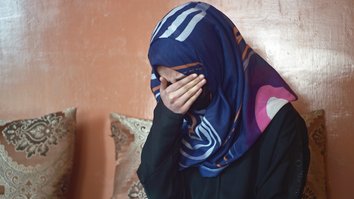KABUL -- Afghanistan's first graduates in women's studies donned caps and gowns Sunday (November 5) to collect what are considered to be unusual qualifications in the patriarchal country.
Kabul University is the country's first higher education institution to offer a degree focused on gender and women's issues, according to the UN Development Programme (UNDP) and university officials.
Feminist theories, media, civil society and conflict resolution were among the topics covered in the two-year master's course, which is funded by South Korea and run by the UNDP.
Offering such a degree would have been unthinkable during the Taliban's repressive 1996-2001 rule, when women were largely confined to their homes and banned from education.
![Fifteen women and seven men graduated from the two-year master's programme in women's studies, a course that would have been unthinkable during the Taliban's repressive 1996-2001 rule. [Shah Marai/AFP]](/cnmi_st/images/2017/11/06/10265-000_u04ft-585_329.jpg)
Fifteen women and seven men graduated from the two-year master's programme in women's studies, a course that would have been unthinkable during the Taliban's repressive 1996-2001 rule. [Shah Marai/AFP]
While protection of women's rights has improved since a US-led invasion toppled the Taliban, women remain repressed in the male-dominated society.
Among the 22 graduates were seven men, including Mujtaba Arefi.
"This is the beginning of a change," Arefi told AFP as he waited to receive his certificate.
"With these programmes we can understand women's place and status in our society," he said. "There is the possibility that we will reach a level of gender equality like the West."
Another graduate, Sajia Sediqqi, said she hoped her classmates would use their degrees to improve the situation of women in Afghanistan.
"In a short period we cannot bring about any dramatic change, but with our higher education we can help change our society and serve our people, particularly our women," she said.

![Afghanistan's first graduates in women's studies donned caps and gowns oNovember 5. Kabul University is the first higher education institution in the country to offer a programme focused on gender and women's issues, according to the UN Development Programme and university officials. [Shah Marai/AFP]](/cnmi_st/images/2017/11/06/10264-000_u04fr-585_329.jpg)






